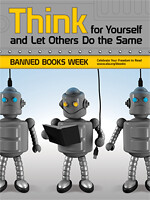Conversations About Science and the Human Spirit
Krista Tippett
You may already know that Krista Tippett is the host of the Sunday Morning NPR interview show that recently changed it's name from Speaking of Faith to On Being. This book illustrates why, after years of broadcasting the show, it was decided to change it's name. The conversations pursued are often only tangentally religious, except in the most broadly defined and Unitarian sense.
The book is made up of a series of radio interviews transcripts with introductions and commentary by Tippett. Each interview is with someone involved in the sciences and each interview attempts to derive some spiritual nuggets from the interview.
The first is with physicist Freeman Dyson, who knew Albert Einstein in the '50's when they were both at the Institute for Advanced Study at Princeton University. Einstein is credited with saying "God does not play dice with the universe," which has been interpreted as a statement of faith in a personal God. Not so, says Dyson, who opines that Einstein's God was the mathematically elegant and mysterious nature of the universe, as demonstrated by his own special and general theories of relativity. Einstein objected to the random nature of results being found in quantum physics. It turns out he was wrong. God does play dice with the universe on the subatomic level.
Einstein's God contains interviews of thirteen scientists, two of whom are also religious figures, V.V. Raman, a physicist who is also a scholar of Hinduism and John Polkinghorne, a British physicist and theologian. Others interviewed are a biographer of Charles Darwin, several psychologists, an astrophysicist and a rheumatologist.The conversations are about the conflict that Darwin felt between his religious faith and his revolutionary theory of evolutionary biological change, the biological basis of revenge and forgiveness, the spiritual effect of clinical depression, the possibility of harmony and acceptance between scientific pursuit and religious faith . . .
On those rare occasions when I have been awake early enough on a Sunday Morning to catch a broadcast of the program I have never failed to become engrossed in the conversation between Tippett and her guest. I did find it a bit more difficult to follow some of these interviews on paper. Perhaps my personal devolution has advanced to a stage where my own opinions intrude too much into what Tippett & co. are saying.

This post is in the 61st

Published at Her Ladyship's Quest.










Excellent review. It's about time that people on all sides realize that maybe, just maybe, science and religion are not exclusive.
ReplyDeletehttp://www.ManOfLaBook.com
Christianity, at least, has been on the retreat in terms of it's explanation of the physical world, ever since Copernicus banished the Earth from the center of the universe. I don't think that retreat is over yet, but yeah, not exclusive, that's the ticket.
ReplyDeleteI bet this was interesting. Thanks for sharing at Cym's. Hey - love the song! It so suits my DH. He always says he's waiting for the movie. Silly guy.
ReplyDeleteThanks for this review. Like your first commenter, I believe that science and faith don't necessarily have to mutually exclude each other. The book sounds interesting, although like you, I that listening to these types of conversations seems a bit more engaging.
ReplyDeleteStopping by from Cym’s Book Review Party.
ReplyDeleteElizabeth
http://silversolara.blogspot.com
I like to think that religion and science are fairly complex forms of thought. People don't start with either of them. They start with base emotion and emotion eventually leads to reason. There is still a belief in the dualistic worldview that says we are born with both. I think there are other ways of thinking.
ReplyDeleteWhether the two are compatible or not is hardly a matter of birthright. I think that a person's worldview may exclude one or the other, or include both, depending on how much ambiguity one can stand.
ReplyDelete